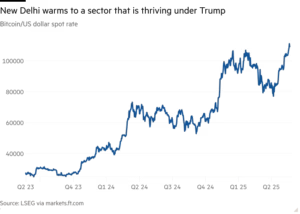India Crypto Industry: The landscape of cryptocurrencies in India features big changes currently taking place. Government officials start embracing digital asset technology after years of keeping crypto akin to forbidden territory. Uncovers how industry leaders are actively pushing for reduced taxes even as regulatory winds shift direction.
Your perception may change while reading about the recent evolution of India’s crypto policy. The previously strict government positions toward cryptocurrencies were met with severe reversals in the past few months. Policymakers show na ew willingness to engage with supporters of blockchain technology.
India Crypto Industry: Tax Burden Causes Industry Challenges
Present taxation regulations put enormous pressure on cryptocurrency transactions across India. Cryptocurrency trades impose hefty tax liabilities that tend to deter mass adoption by ordinary users. Industry players contend that such charges suppress innovation while constraining economic growth opportunities within the industry.
Additionally, present rules introduce convoluted compliance obligations for firms working in India’s crypto market. Firms invest significant capital in deciphering intricate regulatory schemes rather than product development efforts.
Core taxation issues impacting the industry are:
- Transaction fees of as high as 30% on cryptocurrencies earned
- Goods and services taxes imposing additional fees on trading operations
- Sophisticated reporting rules introducing administrative burdens for consumers
Transformation in the attitude of the Government
Latest policy developments reflect the increasing acceptance within top government levels of cryptocurrency’s valid business uses. Earlier resistant regulators come to realize blockchain technology’s upside potential for India’s digital economy transformation objectives.
More senior finance ministry officials interact with industry representatives as part of policy deliberations. The discussions indicate significant shifts in how policymakers will deal with cryptocurrency regulation in the future.
The government sources indicate policymakers learn from effective crypto models in other major economies. Singapore shows that digital asset regulations can enhance innovation while ensuring effective oversight mechanisms.
India Crypto Industry: Industry Advocacy Efforts Intensify
Key crypto firms roll out simultaneous campaigns aimed at influential decision-makers within India’s political elite. The initiatives are centred around showcasing crypto’s potential for beneficial economic growth while, in response to regulatory issues, highlighting the work of industry associations.
Industry associations submit extensive proposals containing how lower rates would spur development in India’s nascent digital asset industry. Representatives contend lower rates would lead to foreign investment while promoting domestic innovation projects.
Business leaders look to other countries where crypto-friendly policies lead to enormous economic gains. These instances are strong evidence of India’s potential economic gains from adopting digital asset technologies more aggressively.
Policy Debates Are Fueled by Economic Gains
The adoption of cryptocurrency can bring considerable revenues in the form of higher trading volumes among Indian investors. Reduced taxes could prompt more individuals to access legitimate digital asset markets instead of looking for foreign alternatives.
In addition, there are enabling policies that could make India a significant player in the international cryptocurrency space. Such positioning has the following potential advantages:
- More foreign direct investment in blockchain ventures
- Creation of jobs in technology and financial services
- Improving India’s stature as a pioneering digital economy
India Crypto Industry: Regulatory Framework Development
Government officials strive to develop comprehensive regulations that reconcile support for innovation with consumer protection needs. Such frameworks seek to shed light on expectations without being overly prescriptive and potentially scaring off business elsewhere.
Recent talks between regulators and industry players indicate authorities understand the imperative of doing crypto policy correctly. Stakeholders are hopeful of future regulatory progress with guarded optimism.
Global regulatory strategies offer India’s policymakers significant insights into developing suitable oversight systems. By learning from others’ experiences, pitfalls are avoided and policy efficacy is maximized.
Future Still Positive
Despite current challenges, cryptocurrency proponents continue to have positive visions of India’s digital asset future. Increasing government involvement brings chances for real policy enhancements that would benefit all the parties concerned.
Participants in the market anticipate incremental policy shifts, not overnight sweeping changes in regulatory practices. The steady approach will enable the adjustment of businesses while keeping adequate oversight intact.
The convergence of lobbying by industry actors and evolving government sentiments provides a supportive environment for crypto industry expansion. Success relies heavily on sustained interactions among all stakeholders pushing towards common good solutions.








Be First to Comment